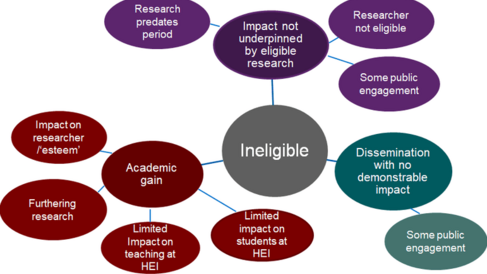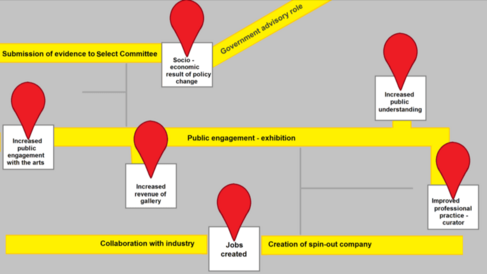REF Impact

Impact in the REF is defined as ‘an effect on, change or benefit to the economy, society, culture, public policy or services, health, the environment or quality of life, beyond academia’.
The University's Global Impact Map lets you explore how research carried out by Cambridge and its partners is having a positive impact around the world.
REF impact
The REF is the UK’s system for assessing the quality of research in UK higher education institutions. The impact period began when the REF2021 impact period ended, so we are already well into the next REF impact period! REF impact is assessed in terms of 'reach' and 'significance':
- Reach (breath of impact) is the extent and/or diversity of the beneficiaries of the impact
- Significance (depth of impact) is the degree to which the impact has enabled, enriched, influenced, informed or changed the performance, policies, practices, products, services, understanding, awareness or wellbeing of the beneficiaries.
REF eligibility criteria
Impact eligible for the REF (or ‘REFable’ impact) is a subset of wider impact. To be eligible for submission in the REF:
- Impact must be underpinned by Cambridge research. Although the impact can have occurred after a researcher has left the institution
- Research underpinning impact must have been undertaken in a specific time period. This is yet to be announced, but normally covers the 20 years prior to submission
- Impact must have occurred in a specific time period (the impact census period, yet to be announced for the next REF). Whilst impact which began before the period can be submitted, only impact which occurred during the period will be assessed
REF ineligible impact
These are some activities commonly mistaken for REFable impact:

Mapping of activities not eligible for REF
- Academic gain. Furthering research and advancing knowledge in an area, prizes and accolades for scholarly work and citations do not constitute impact for the purposes of the REF. They may be included in the ‘environment’ element of submission.
- Pedagogical impact is a special case of academic gain. Although eligible, the guidance states that impact on teaching within the University should form part of a wider case study.
- Impact not underpinned by eligible research. Impact is not eligible if the research predates the applicable period, if the researcher was not eligible at the time the research was conducted (i.e. if they were employed by another HEI), or if there was no underpinning research (some public engagement and outreach will likely fall within this category).
- Dissemination with no demonstrable impact. Evidence is needed that impact occurred. Dissemination alone (e.g. public talks, workshops, media coverage etc.) does not in itself constitute REF impact. An impact case study must demonstrate that a change or benefit has occurred as a result of the dissemination.
- Potential for impact/Future impact. Potential for impact or future impact is not REF eligible, regardless of how imminent and/or certain to happen it is. Impact must have been achieved (and demonstrated to have been achieved) to be eligible.
- Route/pathway to impact. Another common cause of confusion is distinguishing between routes to impact and impact itself. While it is beneficial to describe routes to impact within a case study, it is essential that a destination has been reached. This could be an interim destination on the way to another impact.

Mapping of path to impact
What is a REF impact case study?
Impact is submitted to the REF in the form of impact case studies in a template provided by Research England.
Impact case studies are rated in order of strength:
- World-leading (4*)
- Internationally excellent (3*)
- Recognised internationally (2*)
- Recognised nationally (1*)
The quality level of individual case studies is not published, but Research England does relase the quality profile of impact submissions (i.e. the percentage of 4*, 3*, 2* and 1* impact).
